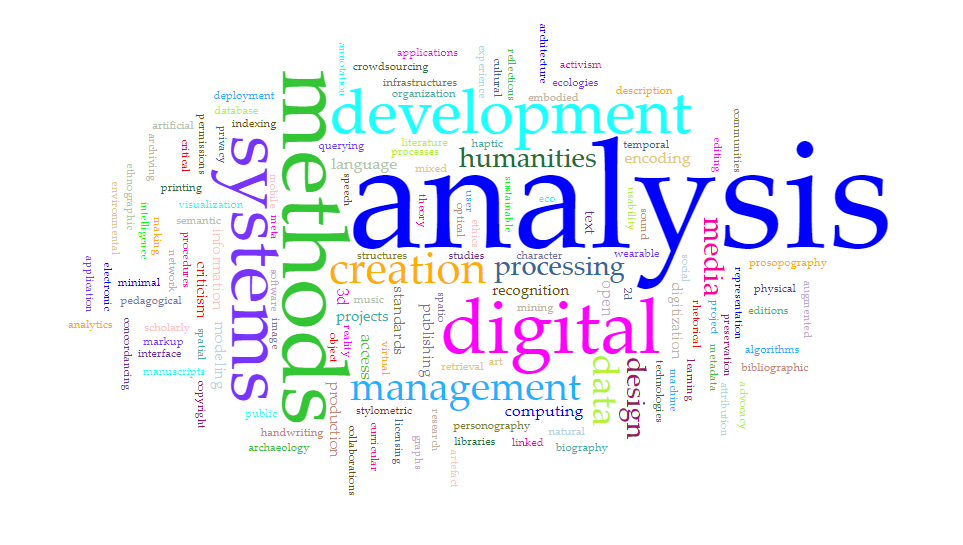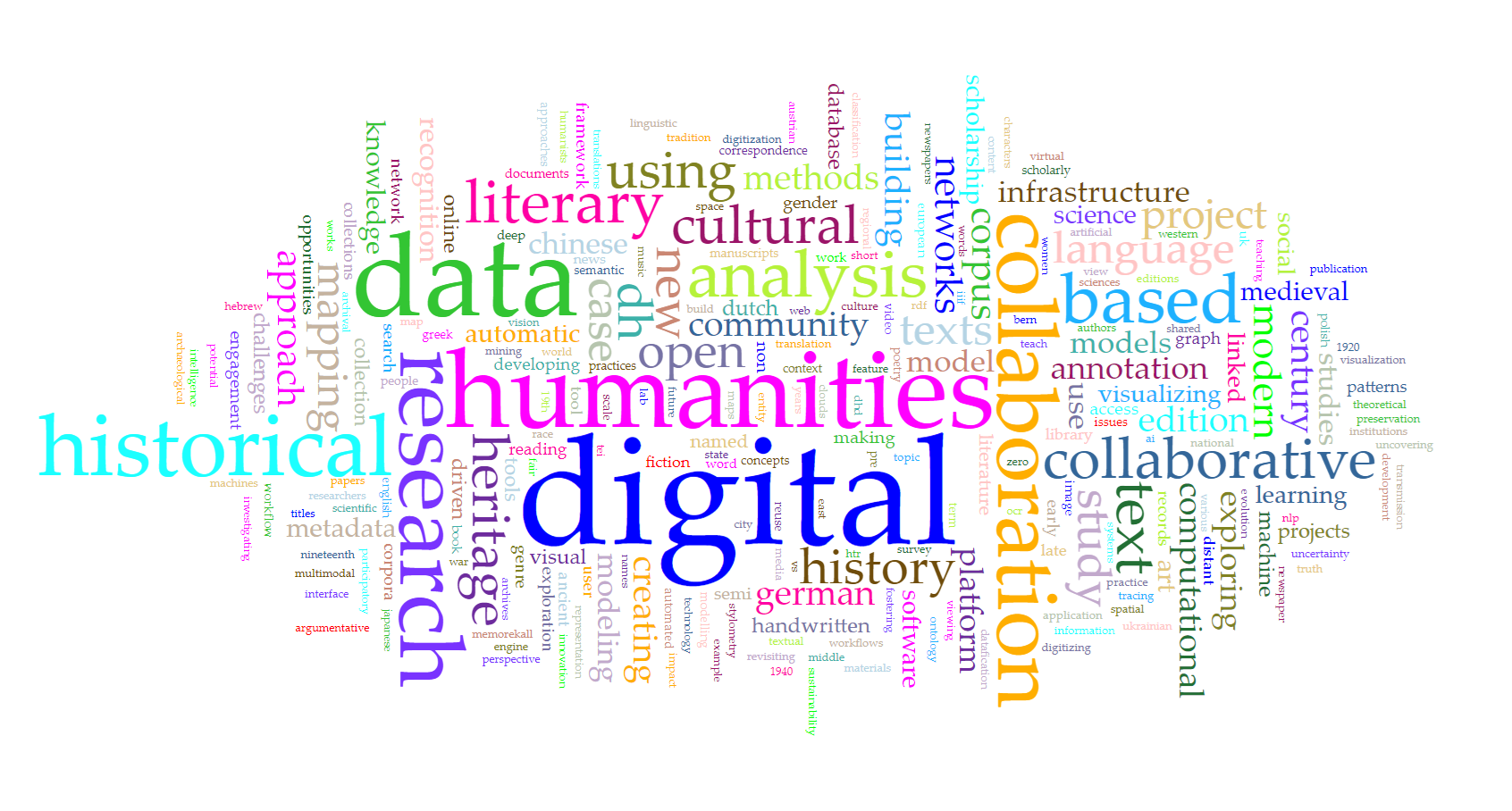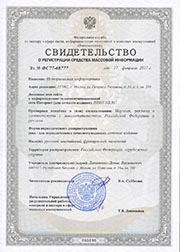|
MAIN PAGE
> Back to contents
Historical informatics
Reference:
Volodin A.U.
“Digital Humanities-2023” in Graz live: ideas, methods and pumpkin seed oil
// Historical informatics.
2023. ¹ 4.
P. 167-175.
DOI: 10.7256/2585-7797.2023.4.69431 EDN: CAKKUT URL: https://en.nbpublish.com/library_read_article.php?id=69431
“Digital Humanities-2023” in Graz live: ideas, methods and pumpkin seed oil
Volodin Andrey Urievich
ORCID: 0000-0001-9681-3214
PhD in History
Associate Professor at the Department of Historical Inforamation Science at Lomonosov Moscow State University (MSU), Head of Digital Humanities Research Institute at Siberian Federal University (SFU)
119991, Russia, Moscow, Lomonosovsky Prospekt, 27k4, office G-423

|
volodin@hist.msu.ru
|
|
 |
Other publications by this author
|
|
|
DOI: 10.7256/2585-7797.2023.4.69431
EDN: CAKKUT
Received:
24-12-2023
Published:
31-12-2023
Abstract:
The article presents the observations of a live participant of the “Digital Humanities -2023”, held in Graz, Austria in the summer of 2023. The “Digital Humanities” Congress is held annually by the Alliance of Digital Humanities Organizations (ADHO). Digital Humanities (DH) are at the intersection of computing or digital technologies and the disciplines of the humanities. It involves the development and use of digital resources and methods in the humanities, as well as the analysis of their application. DH scholarship means collaborative, transdisciplinary, and computationally engaged research, teaching, and publishing. The annual ADHO Conference on Digital Humanities is the central and largest event of the international Digital Humanities community and brings together scholars from around the world, providing them with a unique opportunity to exchange ideas and research results, and to promote future collaboration. Particular attention is paid to historical issues presented at the congress, both in workshops and at section meetings and poster presentations. Statistical observations are presented, and a frequency analysis of the occurrence of keywords is carried out. The main conclusion of the study is the observed trend towards an increase in historical reports, posters and workshops. A noticeable increase in interest in historical sources, historical databases and geographic information systems, and virtual reconstruction of the past using a wide range of digital humanities research tools is noticeable (in comparison with the programs and publications of past Digital Humanities congresses). The 2023 conference theme, “Collaboration as an Opportunity,” is about the transdisciplinary and transnational collaboration, showing how increased cross-national collaboration—across continents and geopolitical locations—can transform regional knowledge hubs into international networks of excellence in research for the benefit of the global digital humanities community. Historians have firmly taken their place in contemporary digital humanities research.
Keywords:
digital humanities, ADHO, historical data science, digital history, programming historian, digital research infrastructures, conftool, collaboration, opportunity, EADH
This article is automatically translated.
You can find original text of the article here.
In 2023, the DH community revived after covid. If the 2nd conference of the European Association of Digital Humanities in Krasnoyarsk in 2021 was held mainly online, and the congress “Digital Humanities -2022” in Tokyo was held entirely in an online format, then the congress “Digital Humanities -2023" (hereinafter — DH-2023) in Graz, Austria, became, in fact, the first post-shaped international platform for a meeting of digital humanities. The Digital Humanities Congress is held annually by the Alliance of Digital Humanitarian Organizations (ACGO/ADHO) [1]. Digital humanities research is located at the intersection of computer or digital technologies and the problems of humanitarian disciplines. This line of research involves the development and use of digital resources and methods applicable in the humanities. ACGO develops joint interdisciplinary research, university courses and academic publications in this area. The annual ACGO Conference on Digital Humanities is the central and largest event of the international Digital Humanities community and brings together scientists from all over the world, providing them with a unique opportunity to share ideas and research results, as well as to promote future cooperation. Discussions about the trends in the development of digital humanities research continue [7], new experiences of self-determination of the direction appear [6], much attention is paid to the peculiarities of the digital transformation of historical knowledge [5] and the peculiarities of historians' cooperation in the era of big data [4]. Probably for this reason, the theme of the DH-2023 congress turned out to be consonant with many historians. The theme of DH-2023 — "Cooperation as an opportunity" — was intended to demonstrate transdisciplinary and transnational cooperation, to show how the expansion of cooperation between different countries – regardless of continent and geopolitical location – can transform regional knowledge centers into international networks of first-class research for the benefit of the global community of digital humanities. 775 applications were submitted for the DH-2023 conference, for which 647 reviewers wrote 2,573 reviews. As a result, 108 long articles, 125 short articles, 112 posters and 28 workshops were selected for participation in the conference. A total of 847 people took part in the conference (749 were in person, 98 joined online). The conference materials are published in a lengthy electronic collection [2].Some personal feedback on participation in the conference has already been published [3]. The technical side of the DH-2023 congress can be described by three names: ConfTool, Whova, Zenodo. ConfTool is a convenient online conference management platform that allows you to manage a large number of participants with very different interests and needs. When registering, you must fill out a detailed questionnaire that allows you to determine the range of interests of the author and possible thematic fields for an expert review. In 2023, the open review rule was implemented, that is, the authors of the reports knew by name the authors of the reviews of their work. And despite the debate about whether the review should be blind or open, experience has shown that, in general, reviewers have treated their role more responsibly and less formally. If we pay attention to the keywords for which articles were submitted for consideration by probably the world's largest commission of reviewers, which is provided by the DH-2023 Congress, thanks to the mutual review capabilities of the ConfTool platform, then most of them quite predictably relate to methods, analytical and digital approaches (see Fig. 1). 
Fig. 1. The cloud of keywords for which applications were submitted at the DH-2023 Congress, visualized using the Cirrus tool on the platform Voyant-tools.org . Whova is an event management application that allows you to feel real online involvement in the conference. The participants of the DH-2023 congress created their profiles in this application, could form a personal program, mark interesting events and meetings that they wanted to attend in the first place, and open chats of interest. Each participant could make a more detailed impression of the speakers who were interested in a particular section. This is a kind of social network that unites participants of a large scientific event and allows you to follow the news, exchange opinions, and take notes for memory. Zenodo is a universal open access repository developed within the framework of the European OpenAire program and managed by CERN. The repository allows you to publish research papers, datasets, research software, and scientific reports (that is, more widely than, for example, on the Dataverse platform [8]). A permanent digital object identifier (DOI) is assigned to the file, which makes it easy to quote stored elements, while there is a special mechanism that tracks the versioning of the stored file. Using the example of the materials of the DH-2023 congress, one can compare the first version published at the beginning of the event with the updated version that appeared following its results [2]. It is quite common to find the opinion that the basis of modern digital humanities research is philological works. However, the DH-2023 congress is quite indicative of a significant share of historical research on today's agenda (see Figure 2, in the titles of the reports and posters of the conference, the words "history" and "historical" turned out to be very frequent). 
Fig. 2. A word cloud from the headlines of all three types of research publications (long articles, short articles and posters) of the DH-2023 Congress (to understand the scale: digital – 92, data – 50, historical – 33, collaboration – 31, history – 15, stylometry – 3). Visualization is performed using the Cirrus tool on the platform Voyant-tools.org . At DH congresses, there is a tradition to start meetings of scientists not with section meetings, but with workshops. I would like to draw attention to two workshops (a complete list of workshops is given in Appendix 1). The workshop of the project “The Programming Historian" [9], which publishes open peer—reviewed lessons on digital humanities methods in four languages - English, Spanish, French and Portuguese, with an emphasis on the necessary tools for historical research. At the workshop, the project was shown from the inside so that it was clear exactly how to create a sought-after and useful methodological product. Among other things, the experience of how a digital humanitarian project can work by overcoming language barriers was presented, and the participants of the seminar offered new ideas, complementing the already very wide range of methods presented on the website of The Programming Historian.
Another interesting workshop was called "Semantic Network and Related Open Data in Historical Sciences". The workshop introduced participants to the use of semantic web technologies and related open data in digital historical research with a special focus on Wikidata [10]. The semantic web and related open data are very relevant for the representation of knowledge in the digital humanities and are especially important for collaboration and data exchange. Since the publication of the first concept of the "Semantic Web" as an extension of the World Wide Web, humanities scientists have been discussing the possibilities and limitations of this model. The Resource Description Framework (RDF) data model has become the standard for modeling machine-readable semantic operators. The RDF data model today forms the basis of various knowledge bases (in particular, Wikidata [10]) and knowledge graphs, which currently appear in various contexts. For this reason, the semantic web and the linking of publicly available data (Linked Open Data) continue to be of particular interest to the digital humanities. The Congress opened on Tuesday evening, July 11, when, after two busy days of workshops, digital humanities gathered in the assembly hall to hear not only welcoming speeches from the authorities, but also a wonderful and impressive report by Sarah Kenderdine, Professor of Digital Museology at the Federal Polytechnic School of Lausanne, "Double Revolution: Computational Museology in the age of Experience." It is impossible to describe the DH Congress in such a way that the story turns out to be at least somewhat complete, so I will only point out some trends that are useful for historians, and scientific materials can be easily found in the collection of reports [2]. Geoinformation technologies play a very significant role in modern DH, a separate section discussed the development of GIS approaches to data linking and visualization. Methods of visualizing data, connections, and ideas are actively developing, and most of the visualization examples are based on systematic historical observations. The discussion of digital methods is increasingly focusing on issues of semantic description, data validation, contextualization and the establishment of complex empirical relationships. Reports devoted to the analysis of complex arrays of documents (the Dutch newspaper corpus, the Berlin Stock Exchange index, French educational literature) were allocated to a separate section "Historical methods". Methodological issues of DH were actively discussed at the "Big Questions" section: how does the figure change our perceptions, what will be the cultural consequences of big data, how specific are the data problems in DH? Archaeology has become an independent subject in DH, which is associated with the discussion of the problems of digitization, preservation and study of historical and cultural heritage. A lot of attention was paid to the concept of open linked data, semantic models and the possibilities of Wikidata development. Network analysis is firmly on the agenda of the DH congresses. For the first time, many reports and several sections were devoted to the application of machine learning and artificial intelligence technologies. Graz is a wonderful city that the participants of the DH-2023 congress could see at a glance from the windows of the reception hall on Castle Hill. Graz is the second largest city in Austria with a very strong university, and it is also the center of the federal state of Styria. The symbol of this region is the oil from the seeds of the Styrian oil pumpkin, which has a characteristic slightly nutty aroma. Each participant of the DH-2023 congress received a small bottle of such oil for a sample. And this memorable taste has become a symbol of an important meeting of researchers from all over the world who are passionate about the use of computer technology in the study of complex humanitarian subjects, scientists who verify humanitarian knowledge "digitally". In 2024, the congress will be held in Washington (USA), the congress will be organized by the famous Roy Rosenzweig Center for History and New Media (RRCHNM), the theme of the conference is announced as "Reinvention and Responsibility" (Reinvention & Responsibility). Roy Rosenzweig, after whom the Center hosting the DH-2024 Congress is named, published one of the first manuals called digital history [11], did a lot for the development of public history in the United States and the world [12]. By the way, it was at the Center of History and New Media that such well-known tools among digital humanities as Zotero and Omeka were invented. And the current director of the Center, S.Robertson, delivered a program article "Differences between digital humanities and digital history" [13]. We can expect a rich historical program next year. By the way, the city that will host the DH Congress in 2025 has been announced in Graz, it will be Lisbon (Portugal). Appendix 1. List of workshops (workshops) held on the eve of the conference “Digital Humanities -2023”
- Digital Humanitarian Organizations Alliance (ADHO) Community Forum: Transparency, Trust, Engagement, Diversity
- Task Modeling Model — Game design as an exercise in formal abstraction
- Amplification of Inaudible Voices in the Digital Humanities: Installation of OpenMethods
- Introduction to Transcribus: How to Use Handwriting Recognition in Research and Teaching
- AudiAnnotate workshop with Radio Venceremos, Rebel Radio Station and SpokenWeb: Using IIIF with AV to create publications and exhibits.
- Creating a DH workflow in the open market of social sciences and humanities
- Create, store and share your own web archives using the open source Webrecorder tools
- DH4MA (Digital Humanities for Marginal Areas). Digitalization of tangible and intangible heritage to promote outlying areas and rural development
- Application of the spaCy Interval Classifier in Digital Humanities
- Digital Newspaper Advertising Research: workflows from the printed page to digital analysis using the Avisblatt-R package
- Development of stylometry standards
- Fundamentals of the development of user-oriented projects in the field of digital humanities
- From sketching to coding: Visualization as a thought process
- How can you trust your code – is error-free code possible?
- Laboratories for laboratories: a joint workshop on the practice of developing digital laboratories in the humanities and social sciences.
- LEAF (Linked Editing Academic Framework): Development of optimized digital scientific workflows using linked editing
- Multilingual Taxonomy Initiative – TaDiRAH as a Community of practitioners
- OCR4all — OCR and HTR open source through the Ages
- Download them to upload: The ParlaMint Corpus for Research in Digital Humanities and Social Sciences
- Semantic network and related open data in the historical sciences
- Special Interest Group "Digital Literary Stylistics" (SIG-DLS) seven years later
- SPARQL for (digital) Humanities: Queries to Wikidata and MiMoTextBase
- "The Programming Historian": Developing a Guide to Digital Humanities
- Collaborative approaches to discourse: Music science using recordings of performances and annotations of related data
- TwinTalks 4: Understanding and Facilitating Remote Collaboration in Digital Humanities
- Who are the users of Multilingual Digital Humanities Research: Exploring the Community
- Seminar "Computer markup and text analysis" (CATMA) with the participation of GitMA and vis-?-vis
- Combining Handwriting Recognition (HTR) technologies: metadata, quality control and learning data exchange process
References
1. ADHO Digital Humanities Conference DH2023 – Graz, Austria 10-14.07.2023. Retrieved from https://dh2023.adho.org/
2. Baillot, A., Tasovac, T., Scholger, W., & Vogeler, G. (2023). Digital Humanities 2023: Book of Abstracts. Digital Humanities 2023. Collaboration as Opportunity. (DH2023), Graz, Austria. doi:10.5281/zenodo.7961822
3. Vestnik Digital Humanities [Herald of the Digital Humanities] # 21. Retrieved from https://dhcloud.org/vestnik-21/
4. Ahnert, R., Griffin, E., Ridge, M., & Tolfo, G. (2023). Collaborative Historical Research in the Age of Big Data: Lessons from an Interdisciplinary Project (Elements in Historical Theory and Practice). Cambridge: Cambridge University Press. doi:10.1017/9781009175548
5. Milligan, I. (2022). The Transformation of Historical Research in the Digital Age (Elements in Historical Theory and Practice). Cambridge: Cambridge University Press. doi:10.1017/9781009026055
6. Cifrovye gumanitarnye issledovanija (2023). [Digital Humanities]. A.B.Antopol'skij, A.A.Bonch-Osmolovskaja, L.I.Borodkin, A.Ju.Volodin [etc.]. Krasnojarsk: SFU. Retrieved from http://lib3.sfu-kras.ru/ft/LIB2/ELIB/b71/free/i-494468.pdf
7. The Bloomsbury Handbook to the Digital Humanities (2022). Bloomsbury Academic.
8. The Dataverse Project. 2023. Retrieved from https://dataverse.org/
9. The Programming Historian. (2023). Retrieved from https://programminghistorian.org/
10. Wikidata. 2023. Retrieved from https://wikidata.org/
11. Cohen, D.J., & Rosenzweig R. (2005). Digital History: A Guide to Gathering, Preserving, and Presenting the Past on the Web. University of Pennsylvania Press.
12. Makhov, A.S. (2013), Roy Rozentsveyg: delaya istoriyu publichnoy. Dialog so vremenem, 43, 180-189.
13. Robertson, S. Razlichiya mezhdu tsifrovymi gumanitarnymi naukami i tsifrovoy istoriey [The Differences between Digital Humanities and Digital History]. Istoriya. 2016. V. 7, Is. 7(51). Retrieved from https://history.jes.su/s207987840001648-1-1/
Peer Review
Peer reviewers' evaluations remain confidential and are not disclosed to the public. Only external reviews, authorized for publication by the article's author(s), are made public. Typically, these final reviews are conducted after the manuscript's revision. Adhering to our double-blind review policy, the reviewer's identity is kept confidential.
The list of publisher reviewers can be found here.
The reviewed article is written in the genre of a scientific review of the congress "Digital Humanities", held this summer in the Austrian city of Graz. It is emphasized that this is the first post-shaped information platform for the direction of scientific research at the junction of digital technologies and the humanities, which in the Russian tradition has been called "digital humanities". From a methodological point of view, the article fully reflects its genre of scientific review: the main research method here is a description with elements of analysis. This is quite justified and makes it possible to achieve the set goal – to create an adequate idea of the scientific forum of "digital humanities". The relevance of the article is due to the not fully defined status of digital humanities and its actively debated place in the system of sciences and scientific disciplines. The article shows the interdisciplinary nature of digital humanities and the diversity of its subjects and issues, which has a rather "motley" character. In the Russian tradition, the place of digital humanities is also not completely defined, at the same time, it is impossible not to note the rather wide interest shown in this area. The novelty of the article is related to the current situation in international scientific cooperation, when the number of contacts between domestic scientists and foreign colleagues has sharply decreased. As a result, any information about current trends in the development of a particular scientific field abroad is of great interest. The structure of the article is quite simple and logical. The introductory part outlines the place and importance of the described congress in the general context of the development of global digital humanities. The preparation and organization of the conference, the technical aspects of its holding are considered. Using visualization (keyword cloud), it is shown that the main areas that the speakers focused on were digital and analytical methods and approaches. As for the analysis of the terminology of the titles of the submitted works, the main attention was paid to the "figure" and data. From the point of view of the author of the article, historical works occupied a significant place in the topics of the congress reports, however, it seems that the provision on increasing the share of historical works requires additional confirmation. The significant role of geoinformation technologies is emphasized, as well as serious attention to the methodology and methodology of research. The appendix contains a list of workshops (training seminars) that were offered to the participants of the congress. The article is written in a good style that allows you to fully perceive the thoughts and arguments of the author. The bibliography consists mainly of foreign publications and electronic resources related to the topic and problems of the article. In some cases, the author has identified controversial issues, but they did not unfold due to the overview nature of the article. In general, the article contains information useful for all categories of readers of the journal "Historical Informatics" and is recommended for publication.
Link to this article
You can simply select and copy link from below text field.
|
|




